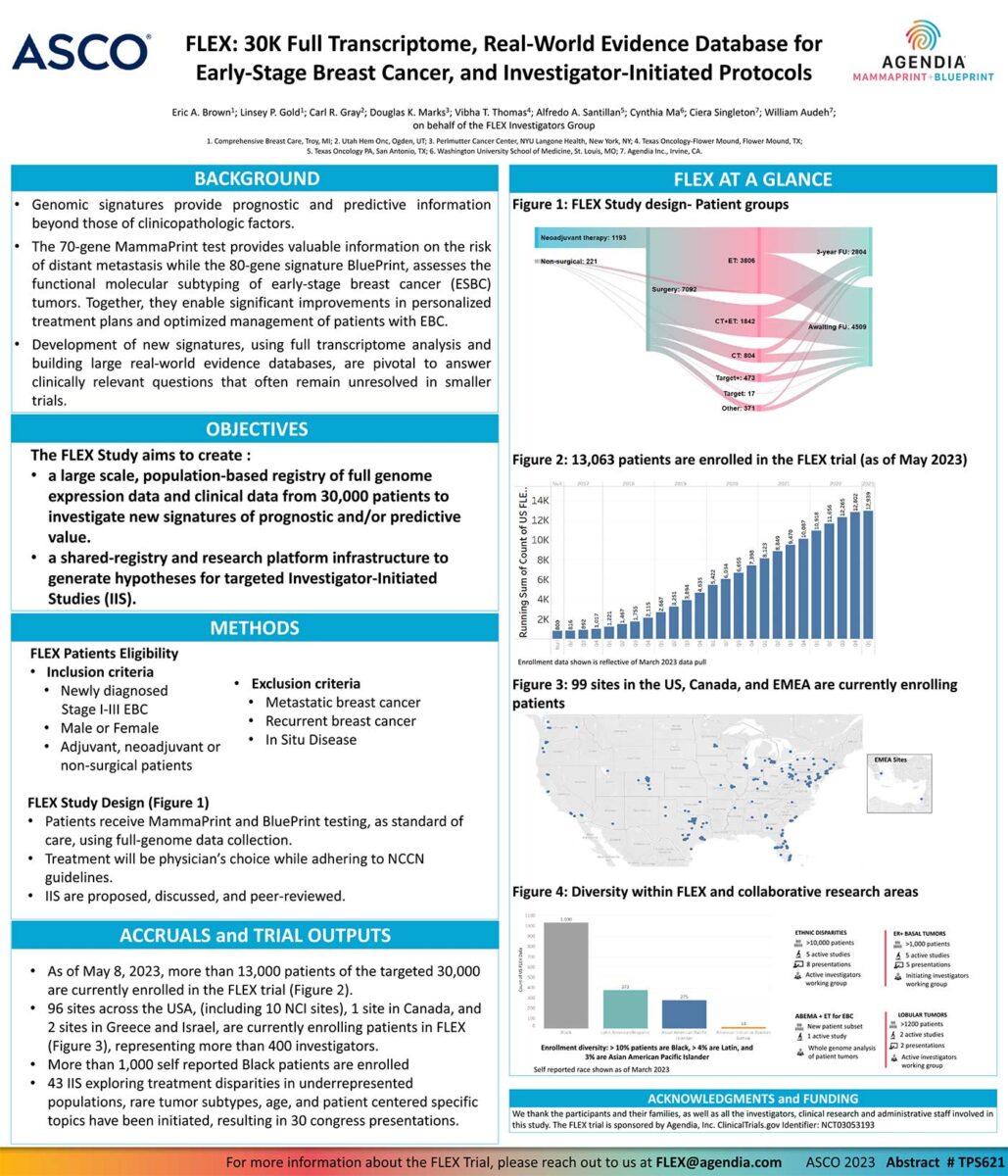
Publication: ASCO 2023, Abstract #TPS621
Authors
Eric A. Brown1; Linsey P. Gold1; Carl R. Gray2; Douglas K. Marks3; Vibha T. Thomas4; Alfredo A. Santillan5; Cynthia Ma6; Ciera Singleton7; William Audeh7;
on behalf of the FLEX Investigators Group
1. Comprehensive Breast Care, Troy, MI; 2. Utah Hem Onc, Ogden, UT; 3. Perlmutter Cancer Center, NYU Langone Health, New York, NY; 4. Texas Oncology-Flower Mound, Flower Mound, TX; 5. Texas Oncology PA, San Antonio, TX; 6. Washington University School of Medicine, St. Louis, MO; 7. Agendia Inc., Irvine, CA.
Background & Objective
Background: Genomic signatures provide prognostic and predictive information beyond those of clinicopathologic factors.
The 70-gene MammaPrint test provides valuable information on the risk of distant metastasis while the 80-gene signature BluePrint, assesses the functional molecular subtyping of early-stage breast cancer (ESBC) tumors. Together, they enable significant improvements in personalized treatment plans and optimized management of patients with EBC.
Development of new signatures, using full transcriptome analysis and building large real-world evidence databases, are pivotal to answer clinically relevant questions that often remain unresolved in smaller trials.
Objective: The FLEX Study aims to create :
a large scale, population-based registry of full genome expression data and clinical data from 30,000 patients to investigate new signatures of prognostic and/or predictive value.
a shared-registry and research platform infrastructure to generate hypotheses for targeted Investigator-Initiated Studies (IIS).
Methods
FLEX Patients Eligibility
Inclusion criteria:
- Newly diagnosed
- Stage I-III EBC
- Male or Female
- Adjuvant, neoadjuvant or
non-surgical patients
Exclusion criteria
- Metastatic breast cancer
- Recurrent breast cancer
- In Situ Disease
FLEX Study Design (Figure 1)
Patients receive MammaPrint and BluePrint testing, as standard of care, using full-genome data collection.
Treatment will be physician’s choice while adhering to NCCN guidelines.
IIS are proposed, discussed, and peer-reviewed.
Accruals and Trial Outputs
- As of May 8, 2023, more than 13,000 patients of the targeted 30,000 are currently enrolled in the FLEX trial (Figure 2).
- 96 sites across the USA, (including 10 NCI sites), 1 site in Canada, and 2 sites in Greece and Israel, are currently enrolling patients in FLEX (Figure 3), representing more than 400 investigators.
- More than 1,000 self reported Black patients are enrolled
- 43 IIS exploring treatment disparities in underrepresented populations, rare tumor subtypes, age, and patient centered specific topics have been initiated, resulting in 30 congress presentations.
Acknowledgments and Funding:
We thank the participants and their families, as well as all the investigators, clinical research and administrative staff involved in this study. The FLEX trial is sponsored by Agendia, Inc. ClinicalTrials.gov Identifier: NCT03053193
For more information about the FLEX Trial, please reach out to us at FLEX@agendia.com


